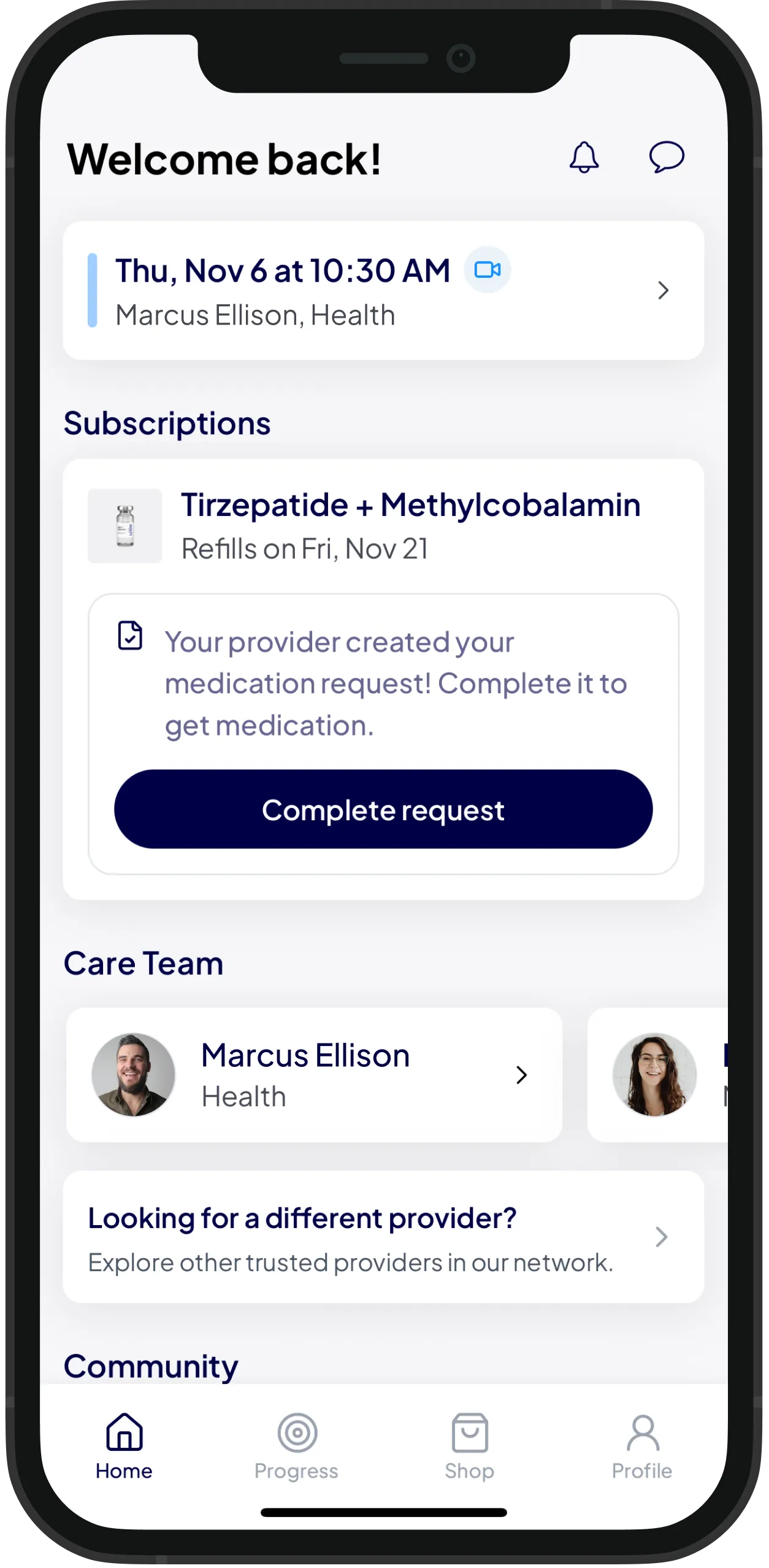Ready to transform your health?
Unlock access to expert guidance and a weight care plan crafted just for you.
Ready to transform your health?
Unlock access to expert guidance and a weight care plan crafted just for you.
Branded medication
Branded medication
Branded medication
Updated on
Updated on
Updated on
Nov 14, 2024
Nov 14, 2024
Nov 14, 2024
Does Wegovy® Cause Cancer?
Does Wegovy® Cause Cancer?
Does Wegovy® Cause Cancer?
Explore the latest research on whether Wegovy® may be linked to cancer risks. Get informed with our comprehensive analysis and expert insights.
Explore the latest research on whether Wegovy® may be linked to cancer risks. Get informed with our comprehensive analysis and expert insights.
Explore the latest research on whether Wegovy® may be linked to cancer risks. Get informed with our comprehensive analysis and expert insights.



Table of Contents
Table of Contents
Table of Contents
Is The Risk Of Cancer Higher After Taking Wegovy®?
Unpacking the Research on Wegovy® and Cancer
Reducing Cancer Risk While Taking Wegovy
Weighing the Benefits and Risks of Taking Wegovy
Is The Risk Of Cancer Higher After Taking Wegovy®?
Unpacking the Research on Wegovy® and Cancer
Reducing Cancer Risk While Taking Wegovy
Weighing the Benefits and Risks of Taking Wegovy
Is The Risk Of Cancer Higher After Taking Wegovy®?
Unpacking the Research on Wegovy® and Cancer
Reducing Cancer Risk While Taking Wegovy
Weighing the Benefits and Risks of Taking Wegovy
Wegovy, a weight loss drug that has garnered significant attention for its effectiveness, has also raised concerns about its safety, particularly regarding its association with cancer. This article aims to provide a well-rounded view, examining the current understanding of Wegovy's link to cancer, insights from research, and how to minimize potential risks.
Is The Risk Of Cancer Higher After Taking Wegovy®?
Wegovy is approved for weight loss in patients who are obese or overweight with weight-related conditions. It uses the active ingredient semaglutide, the same one used in Mounjaro®, which is approved for type 2 diabetes. Wegovy® and Mounjaro® function by mimicking a hormone that targets areas of the brain involved in appetite regulation, thereby reducing hunger and calorie intake (1). Studies have shown Wegovy® to be very effective in achieving weight loss in combination with healthy lifestyle changes (2). However, like any medication, Wegovy® comes with its share of potential side effects, which are most commonly gastrointestinal disruptions, including nausea, vomiting, diarrhea, and stomach upset (3). Given its recent introduction to the market, questions about long-term effects, including cancer risk, are common and valid. As of now:
No direct causal link has been established between Wegovy® and cancer in humans.
Ongoing surveillance and studies are essential to monitor long-term effects, as the drug's history doesn't yet allow for a complete picture.
The U.S. Food and Drug Administration (FDA) has emphasized the importance of studies continually assessing the drug’s safety profile.
Unpacking the Research on Wegovy® and Cancer
Investigating the safety of any medication, including Wegovy®, involves lengthy, detailed research. Here's what current studies indicate:
Animal studies: Research on rodents indicates an increased risk of certain types of thyroid cancers with semaglutide, the primary active ingredient in Wegovy® (4,5). However, translating these outcomes to humans requires caution due to fundamental biological differences.
Human trials: Extensive high-quality trials in humans have not demonstrated an increased risk for developing pancreatic, thyroid, or other types of cancer, specifically due to Wegovy® (6). However, comprehensive long-term data is still being collected.
Understanding the Research on Wegovy’s Connection To Cancer
Animal studies say one thing and human studies say another – what does this mean for someone considering Wegovy®? The FDA takes any indication of a drug’s potential for causing increased cancer risks seriously. Due to animal studies that showed Wegovy®, and medicines that work like Wegovy®, caused thyroid tumors and cancer in rodents, providers use extra precautions before prescribing the medication to just anyone. It is recommended that you do NOT start Wegovy® if you or any of your family have ever had a type of thyroid cancer called medullary thyroid carcinoma (MTC) or if you have been diagnosed with a condition called Multiple Endocrine Neoplasia (MEN) syndrome type 2 (4).
Key Points:
Based on animal studies, we know that semaglutide has been linked to thyroid tumors and cancer, but human studies have not shown an increased risk. Ongoing research is essential for a conclusive understanding.
Providers exercise abundant caution when prescribing Wegovy®, so providing an accurate family history is key to safely choosing a weight loss medication.
Reducing Cancer Risk While Taking Wegovy
For individuals considering or currently taking Wegovy®, here are some tips to avoid rare but serious complications from Wegovy:
Review your medical history thoroughly: To reduce the unlikely risk of developing thyroid cancer, it is recommended that you do NOT start Ozempic® if you or anyone in your family has ever had a type of thyroid cancer called medullary thyroid carcinoma (MTC) or if you have been diagnosed with a condition called Multiple Endocrine Neoplasia (MEN) syndrome type 2 (4).
Regular check-ups: Inform your doctor about any new or unusual symptoms after starting Wegovy®, no matter how minor they may seem. Symptoms of thyroid cancer include a new lump or swelling in the neck, trouble swallowing or breathing, and/or voice changes such as hoarseness. Talk with your provider immediately if you are concerned about any of these symptoms.
Healthy lifestyle: Maintain a balanced diet, regular exercise, and avoid smoking or excessive alcohol consumption.
Weighing the Benefits and Risks of Taking Wegovy
Individuals afflicted with obesity face a heightened susceptibility to developing additional health conditions, including but not limited to hypertension, type 2 diabetes, hyperlipidemia, stroke, and specific forms of cancer (7). Wegovy® can help combat obesity so you can be the best version of yourself. Talk with your doctor to see if Wegovy® is right for you.
Each individual’s health profile is unique, so what works for one person may not be suitable for another. Explore other medication options here: https://joinmochi.com/medications
While concerns about Wegovy® and cancer risk are understandable, current research does not establish a direct link. It’s important to understand the potential benefits and be aware of risks if you are taking Wegovy® or considering it as a part of your weight loss plan. Always consult healthcare professionals for advice tailored to your health situation, and stay informed about new research findings as they emerge.
Connect with a Mochi Health provider for tailored guidance from an obesity medicine specialist. Our program at Mochi Health includes personalized weight care, access to GLP-1 medications, and expert support every step of the way. Check your eligibility and start your health transformation today.
This post was written by our team of health writers for informational purposes only and does not constitute medical advice. Always consult your doctor or healthcare provider for personalized guidance regarding your health. Ozempic®, Wegovy®, Mounjaro®, and Zepbound® and their delivery device are registered trademarks. Mochi Health is a telehealth clinic that offers prescriptions for these products by medical necessity only as determined by a licensed health provider.
Sources
Singh, G., Krauthamer, M., & Bjalme-Evans, M. (2022). Wegovy® (semaglutide): a new weight loss drug for chronic weight management. Journal of investigative medicine : the official publication of the American Federation for Clinical Research, 70(1), 5–13. https://doi.org/10.1136/jim-2021-001952
Wilding, J. P. H., Batterham, R. L., Calanna, S., Davies, M., Van Gaal, L. F., Lingvay, I., McGowan, B. M., Rosenstock, J., Tran, M. T. D., Wadden, T. A., Wharton, S., Yokote, K., Zeuthen, N., Kushner, R. F., & STEP 1 Study Group (2021). Once-Weekly Semaglutide in Adults with Overweight or Obesity. The New England journal of medicine, 384(11), 989–1002. https://www.nejm.org/doi/10.1056/NEJMoa2032183?url_ver=Z39.88-2003&rfr_id=ori:rid:crossref.org&rfr_dat=cr_pub%20%200pubmed
Bettge, K., Kahle, M., Abd El Aziz, M.S., Meier, J.J., Nauck, M.A., 2017. Occurrence of nausea, vomiting and diarrhoea reported as adverse events in clinical trials studying glucagon-like peptide-1 receptor agonists: A systematic analysis of published clinical trials. Diabetes Obesity and Metabolism 19:336e347. https://dom-pubs.pericles-prod.literatumonline.com/doi/10.1111/dom.12824
Food and Drug Administration. (n.d.). Wegovy® (semaglutide) injection, for subcutaneous use. Access Data FDA. https://www.accessdata.fda.gov/drugsatfda_docs/label/2023/215256s007lbl.pdf
Madsen, L. W., Knauf, J. A., Gotfredsen, C., Pilling, A., Sjögren, I., Andersen, S., Andersen, L., de Boer, A. S., Manova, K., Barlas, A., Vundavalli, S., Nyborg, N. C., Knudsen, L. B., Moelck, A. M., & Fagin, J. A. (2012). GLP-1 receptor agonists and the thyroid: C-cell effects in mice are mediated via the GLP-1 receptor and not associated with RET activation. Endocrinology, 153(3), 1538–1547. https://doi.org/10.1210/en.2011-1864
Nagendra, L., Bg, H., Sharma, M., & Dutta, D. (2023). Semaglutide and cancer: A systematic review and meta-analysis. Diabetes & metabolic syndrome, 17(9), 102834. https://www.sciencedirect.com/science/article/abs/pii/S1871402123001303?via%3Dihub
Ahrén B, Atkin SL, Charpentier G, et al.. Semaglutide induces weight loss in subjects with type 2 diabetes regardless of baseline BMI or gastrointestinal adverse events in the SUSTAIN 1 to 5 trials. Diabetes Obes Metab 2018;20:2210–9. 10.1111/dom.13353. https://www.ncbi.nlm.nih.gov/pmc/articles/pmid/29766634/
Wegovy, a weight loss drug that has garnered significant attention for its effectiveness, has also raised concerns about its safety, particularly regarding its association with cancer. This article aims to provide a well-rounded view, examining the current understanding of Wegovy's link to cancer, insights from research, and how to minimize potential risks.
Is The Risk Of Cancer Higher After Taking Wegovy®?
Wegovy is approved for weight loss in patients who are obese or overweight with weight-related conditions. It uses the active ingredient semaglutide, the same one used in Mounjaro®, which is approved for type 2 diabetes. Wegovy® and Mounjaro® function by mimicking a hormone that targets areas of the brain involved in appetite regulation, thereby reducing hunger and calorie intake (1). Studies have shown Wegovy® to be very effective in achieving weight loss in combination with healthy lifestyle changes (2). However, like any medication, Wegovy® comes with its share of potential side effects, which are most commonly gastrointestinal disruptions, including nausea, vomiting, diarrhea, and stomach upset (3). Given its recent introduction to the market, questions about long-term effects, including cancer risk, are common and valid. As of now:
No direct causal link has been established between Wegovy® and cancer in humans.
Ongoing surveillance and studies are essential to monitor long-term effects, as the drug's history doesn't yet allow for a complete picture.
The U.S. Food and Drug Administration (FDA) has emphasized the importance of studies continually assessing the drug’s safety profile.
Unpacking the Research on Wegovy® and Cancer
Investigating the safety of any medication, including Wegovy®, involves lengthy, detailed research. Here's what current studies indicate:
Animal studies: Research on rodents indicates an increased risk of certain types of thyroid cancers with semaglutide, the primary active ingredient in Wegovy® (4,5). However, translating these outcomes to humans requires caution due to fundamental biological differences.
Human trials: Extensive high-quality trials in humans have not demonstrated an increased risk for developing pancreatic, thyroid, or other types of cancer, specifically due to Wegovy® (6). However, comprehensive long-term data is still being collected.
Understanding the Research on Wegovy’s Connection To Cancer
Animal studies say one thing and human studies say another – what does this mean for someone considering Wegovy®? The FDA takes any indication of a drug’s potential for causing increased cancer risks seriously. Due to animal studies that showed Wegovy®, and medicines that work like Wegovy®, caused thyroid tumors and cancer in rodents, providers use extra precautions before prescribing the medication to just anyone. It is recommended that you do NOT start Wegovy® if you or any of your family have ever had a type of thyroid cancer called medullary thyroid carcinoma (MTC) or if you have been diagnosed with a condition called Multiple Endocrine Neoplasia (MEN) syndrome type 2 (4).
Key Points:
Based on animal studies, we know that semaglutide has been linked to thyroid tumors and cancer, but human studies have not shown an increased risk. Ongoing research is essential for a conclusive understanding.
Providers exercise abundant caution when prescribing Wegovy®, so providing an accurate family history is key to safely choosing a weight loss medication.
Reducing Cancer Risk While Taking Wegovy
For individuals considering or currently taking Wegovy®, here are some tips to avoid rare but serious complications from Wegovy:
Review your medical history thoroughly: To reduce the unlikely risk of developing thyroid cancer, it is recommended that you do NOT start Ozempic® if you or anyone in your family has ever had a type of thyroid cancer called medullary thyroid carcinoma (MTC) or if you have been diagnosed with a condition called Multiple Endocrine Neoplasia (MEN) syndrome type 2 (4).
Regular check-ups: Inform your doctor about any new or unusual symptoms after starting Wegovy®, no matter how minor they may seem. Symptoms of thyroid cancer include a new lump or swelling in the neck, trouble swallowing or breathing, and/or voice changes such as hoarseness. Talk with your provider immediately if you are concerned about any of these symptoms.
Healthy lifestyle: Maintain a balanced diet, regular exercise, and avoid smoking or excessive alcohol consumption.
Weighing the Benefits and Risks of Taking Wegovy
Individuals afflicted with obesity face a heightened susceptibility to developing additional health conditions, including but not limited to hypertension, type 2 diabetes, hyperlipidemia, stroke, and specific forms of cancer (7). Wegovy® can help combat obesity so you can be the best version of yourself. Talk with your doctor to see if Wegovy® is right for you.
Each individual’s health profile is unique, so what works for one person may not be suitable for another. Explore other medication options here: https://joinmochi.com/medications
While concerns about Wegovy® and cancer risk are understandable, current research does not establish a direct link. It’s important to understand the potential benefits and be aware of risks if you are taking Wegovy® or considering it as a part of your weight loss plan. Always consult healthcare professionals for advice tailored to your health situation, and stay informed about new research findings as they emerge.
Connect with a Mochi Health provider for tailored guidance from an obesity medicine specialist. Our program at Mochi Health includes personalized weight care, access to GLP-1 medications, and expert support every step of the way. Check your eligibility and start your health transformation today.
This post was written by our team of health writers for informational purposes only and does not constitute medical advice. Always consult your doctor or healthcare provider for personalized guidance regarding your health. Ozempic®, Wegovy®, Mounjaro®, and Zepbound® and their delivery device are registered trademarks. Mochi Health is a telehealth clinic that offers prescriptions for these products by medical necessity only as determined by a licensed health provider.
Sources
Singh, G., Krauthamer, M., & Bjalme-Evans, M. (2022). Wegovy® (semaglutide): a new weight loss drug for chronic weight management. Journal of investigative medicine : the official publication of the American Federation for Clinical Research, 70(1), 5–13. https://doi.org/10.1136/jim-2021-001952
Wilding, J. P. H., Batterham, R. L., Calanna, S., Davies, M., Van Gaal, L. F., Lingvay, I., McGowan, B. M., Rosenstock, J., Tran, M. T. D., Wadden, T. A., Wharton, S., Yokote, K., Zeuthen, N., Kushner, R. F., & STEP 1 Study Group (2021). Once-Weekly Semaglutide in Adults with Overweight or Obesity. The New England journal of medicine, 384(11), 989–1002. https://www.nejm.org/doi/10.1056/NEJMoa2032183?url_ver=Z39.88-2003&rfr_id=ori:rid:crossref.org&rfr_dat=cr_pub%20%200pubmed
Bettge, K., Kahle, M., Abd El Aziz, M.S., Meier, J.J., Nauck, M.A., 2017. Occurrence of nausea, vomiting and diarrhoea reported as adverse events in clinical trials studying glucagon-like peptide-1 receptor agonists: A systematic analysis of published clinical trials. Diabetes Obesity and Metabolism 19:336e347. https://dom-pubs.pericles-prod.literatumonline.com/doi/10.1111/dom.12824
Food and Drug Administration. (n.d.). Wegovy® (semaglutide) injection, for subcutaneous use. Access Data FDA. https://www.accessdata.fda.gov/drugsatfda_docs/label/2023/215256s007lbl.pdf
Madsen, L. W., Knauf, J. A., Gotfredsen, C., Pilling, A., Sjögren, I., Andersen, S., Andersen, L., de Boer, A. S., Manova, K., Barlas, A., Vundavalli, S., Nyborg, N. C., Knudsen, L. B., Moelck, A. M., & Fagin, J. A. (2012). GLP-1 receptor agonists and the thyroid: C-cell effects in mice are mediated via the GLP-1 receptor and not associated with RET activation. Endocrinology, 153(3), 1538–1547. https://doi.org/10.1210/en.2011-1864
Nagendra, L., Bg, H., Sharma, M., & Dutta, D. (2023). Semaglutide and cancer: A systematic review and meta-analysis. Diabetes & metabolic syndrome, 17(9), 102834. https://www.sciencedirect.com/science/article/abs/pii/S1871402123001303?via%3Dihub
Ahrén B, Atkin SL, Charpentier G, et al.. Semaglutide induces weight loss in subjects with type 2 diabetes regardless of baseline BMI or gastrointestinal adverse events in the SUSTAIN 1 to 5 trials. Diabetes Obes Metab 2018;20:2210–9. 10.1111/dom.13353. https://www.ncbi.nlm.nih.gov/pmc/articles/pmid/29766634/
Wegovy, a weight loss drug that has garnered significant attention for its effectiveness, has also raised concerns about its safety, particularly regarding its association with cancer. This article aims to provide a well-rounded view, examining the current understanding of Wegovy's link to cancer, insights from research, and how to minimize potential risks.
Is The Risk Of Cancer Higher After Taking Wegovy®?
Wegovy is approved for weight loss in patients who are obese or overweight with weight-related conditions. It uses the active ingredient semaglutide, the same one used in Mounjaro®, which is approved for type 2 diabetes. Wegovy® and Mounjaro® function by mimicking a hormone that targets areas of the brain involved in appetite regulation, thereby reducing hunger and calorie intake (1). Studies have shown Wegovy® to be very effective in achieving weight loss in combination with healthy lifestyle changes (2). However, like any medication, Wegovy® comes with its share of potential side effects, which are most commonly gastrointestinal disruptions, including nausea, vomiting, diarrhea, and stomach upset (3). Given its recent introduction to the market, questions about long-term effects, including cancer risk, are common and valid. As of now:
No direct causal link has been established between Wegovy® and cancer in humans.
Ongoing surveillance and studies are essential to monitor long-term effects, as the drug's history doesn't yet allow for a complete picture.
The U.S. Food and Drug Administration (FDA) has emphasized the importance of studies continually assessing the drug’s safety profile.
Unpacking the Research on Wegovy® and Cancer
Investigating the safety of any medication, including Wegovy®, involves lengthy, detailed research. Here's what current studies indicate:
Animal studies: Research on rodents indicates an increased risk of certain types of thyroid cancers with semaglutide, the primary active ingredient in Wegovy® (4,5). However, translating these outcomes to humans requires caution due to fundamental biological differences.
Human trials: Extensive high-quality trials in humans have not demonstrated an increased risk for developing pancreatic, thyroid, or other types of cancer, specifically due to Wegovy® (6). However, comprehensive long-term data is still being collected.
Understanding the Research on Wegovy’s Connection To Cancer
Animal studies say one thing and human studies say another – what does this mean for someone considering Wegovy®? The FDA takes any indication of a drug’s potential for causing increased cancer risks seriously. Due to animal studies that showed Wegovy®, and medicines that work like Wegovy®, caused thyroid tumors and cancer in rodents, providers use extra precautions before prescribing the medication to just anyone. It is recommended that you do NOT start Wegovy® if you or any of your family have ever had a type of thyroid cancer called medullary thyroid carcinoma (MTC) or if you have been diagnosed with a condition called Multiple Endocrine Neoplasia (MEN) syndrome type 2 (4).
Key Points:
Based on animal studies, we know that semaglutide has been linked to thyroid tumors and cancer, but human studies have not shown an increased risk. Ongoing research is essential for a conclusive understanding.
Providers exercise abundant caution when prescribing Wegovy®, so providing an accurate family history is key to safely choosing a weight loss medication.
Reducing Cancer Risk While Taking Wegovy
For individuals considering or currently taking Wegovy®, here are some tips to avoid rare but serious complications from Wegovy:
Review your medical history thoroughly: To reduce the unlikely risk of developing thyroid cancer, it is recommended that you do NOT start Ozempic® if you or anyone in your family has ever had a type of thyroid cancer called medullary thyroid carcinoma (MTC) or if you have been diagnosed with a condition called Multiple Endocrine Neoplasia (MEN) syndrome type 2 (4).
Regular check-ups: Inform your doctor about any new or unusual symptoms after starting Wegovy®, no matter how minor they may seem. Symptoms of thyroid cancer include a new lump or swelling in the neck, trouble swallowing or breathing, and/or voice changes such as hoarseness. Talk with your provider immediately if you are concerned about any of these symptoms.
Healthy lifestyle: Maintain a balanced diet, regular exercise, and avoid smoking or excessive alcohol consumption.
Weighing the Benefits and Risks of Taking Wegovy
Individuals afflicted with obesity face a heightened susceptibility to developing additional health conditions, including but not limited to hypertension, type 2 diabetes, hyperlipidemia, stroke, and specific forms of cancer (7). Wegovy® can help combat obesity so you can be the best version of yourself. Talk with your doctor to see if Wegovy® is right for you.
Each individual’s health profile is unique, so what works for one person may not be suitable for another. Explore other medication options here: https://joinmochi.com/medications
While concerns about Wegovy® and cancer risk are understandable, current research does not establish a direct link. It’s important to understand the potential benefits and be aware of risks if you are taking Wegovy® or considering it as a part of your weight loss plan. Always consult healthcare professionals for advice tailored to your health situation, and stay informed about new research findings as they emerge.
Connect with a Mochi Health provider for tailored guidance from an obesity medicine specialist. Our program at Mochi Health includes personalized weight care, access to GLP-1 medications, and expert support every step of the way. Check your eligibility and start your health transformation today.
This post was written by our team of health writers for informational purposes only and does not constitute medical advice. Always consult your doctor or healthcare provider for personalized guidance regarding your health. Ozempic®, Wegovy®, Mounjaro®, and Zepbound® and their delivery device are registered trademarks. Mochi Health is a telehealth clinic that offers prescriptions for these products by medical necessity only as determined by a licensed health provider.
Sources
Singh, G., Krauthamer, M., & Bjalme-Evans, M. (2022). Wegovy® (semaglutide): a new weight loss drug for chronic weight management. Journal of investigative medicine : the official publication of the American Federation for Clinical Research, 70(1), 5–13. https://doi.org/10.1136/jim-2021-001952
Wilding, J. P. H., Batterham, R. L., Calanna, S., Davies, M., Van Gaal, L. F., Lingvay, I., McGowan, B. M., Rosenstock, J., Tran, M. T. D., Wadden, T. A., Wharton, S., Yokote, K., Zeuthen, N., Kushner, R. F., & STEP 1 Study Group (2021). Once-Weekly Semaglutide in Adults with Overweight or Obesity. The New England journal of medicine, 384(11), 989–1002. https://www.nejm.org/doi/10.1056/NEJMoa2032183?url_ver=Z39.88-2003&rfr_id=ori:rid:crossref.org&rfr_dat=cr_pub%20%200pubmed
Bettge, K., Kahle, M., Abd El Aziz, M.S., Meier, J.J., Nauck, M.A., 2017. Occurrence of nausea, vomiting and diarrhoea reported as adverse events in clinical trials studying glucagon-like peptide-1 receptor agonists: A systematic analysis of published clinical trials. Diabetes Obesity and Metabolism 19:336e347. https://dom-pubs.pericles-prod.literatumonline.com/doi/10.1111/dom.12824
Food and Drug Administration. (n.d.). Wegovy® (semaglutide) injection, for subcutaneous use. Access Data FDA. https://www.accessdata.fda.gov/drugsatfda_docs/label/2023/215256s007lbl.pdf
Madsen, L. W., Knauf, J. A., Gotfredsen, C., Pilling, A., Sjögren, I., Andersen, S., Andersen, L., de Boer, A. S., Manova, K., Barlas, A., Vundavalli, S., Nyborg, N. C., Knudsen, L. B., Moelck, A. M., & Fagin, J. A. (2012). GLP-1 receptor agonists and the thyroid: C-cell effects in mice are mediated via the GLP-1 receptor and not associated with RET activation. Endocrinology, 153(3), 1538–1547. https://doi.org/10.1210/en.2011-1864
Nagendra, L., Bg, H., Sharma, M., & Dutta, D. (2023). Semaglutide and cancer: A systematic review and meta-analysis. Diabetes & metabolic syndrome, 17(9), 102834. https://www.sciencedirect.com/science/article/abs/pii/S1871402123001303?via%3Dihub
Ahrén B, Atkin SL, Charpentier G, et al.. Semaglutide induces weight loss in subjects with type 2 diabetes regardless of baseline BMI or gastrointestinal adverse events in the SUSTAIN 1 to 5 trials. Diabetes Obes Metab 2018;20:2210–9. 10.1111/dom.13353. https://www.ncbi.nlm.nih.gov/pmc/articles/pmid/29766634/
Read next
Ready to transform your health?
Unlock access to expert guidance and a weight care plan crafted just for you.

Ready to transform your health?
Unlock access to expert guidance and a weight care plan crafted just for you.

Ready to transform your health?
Unlock access to expert guidance and a weight care plan crafted just for you.


© 2026 Mochi Health
All professional medical services are provided by licensed physicians and clinicians affiliated with independently owned and operated professional practices. Mochi Health Corp. provides administrative and technology services to affiliated medical practices it supports, and does not provide any professional medical services itself.


© 2026 Mochi Health
All professional medical services are provided by licensed physicians and clinicians affiliated with independently owned and operated professional practices. Mochi Health Corp. provides administrative and technology services to affiliated medical practices it supports, and does not provide any professional medical services itself.


© 2026 Mochi Health
All professional medical services are provided by licensed physicians and clinicians affiliated with independently owned and operated professional practices. Mochi Health Corp. provides administrative and technology services to affiliated medical practices it supports, and does not provide any professional medical services itself.





















